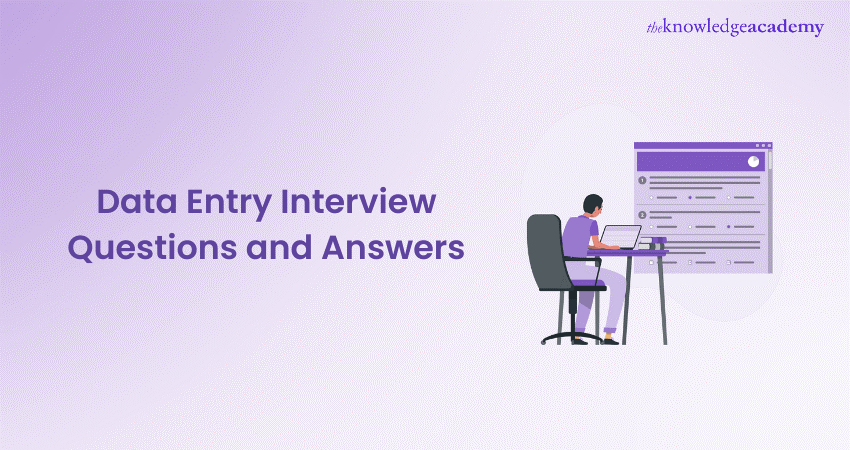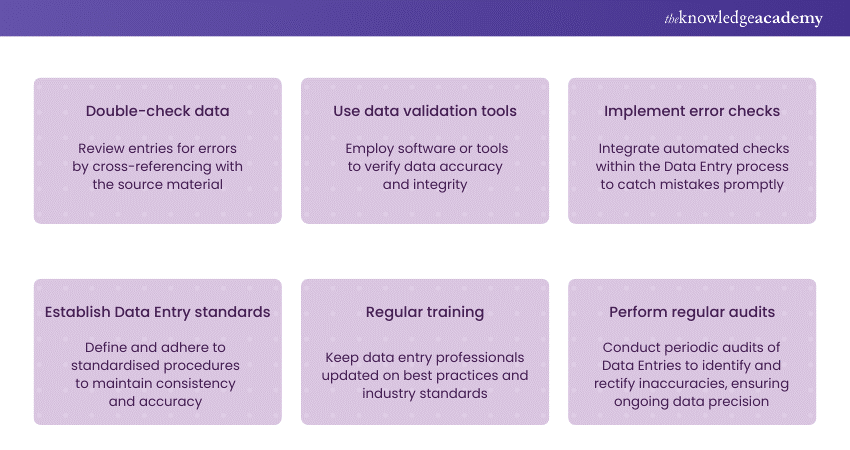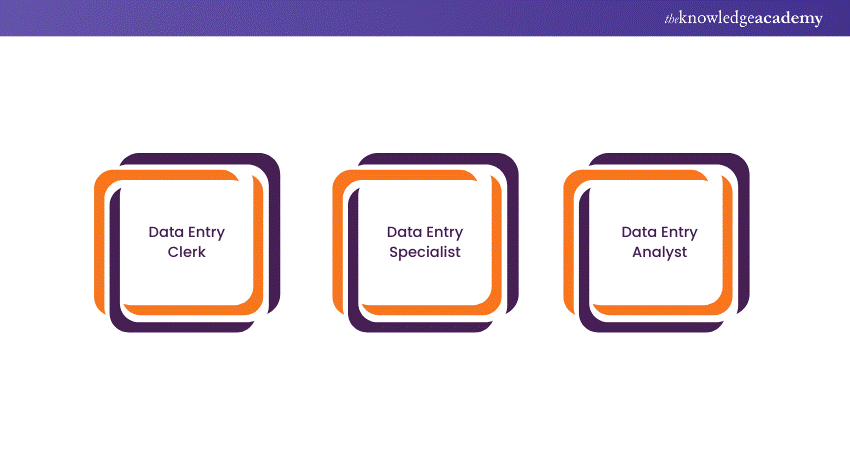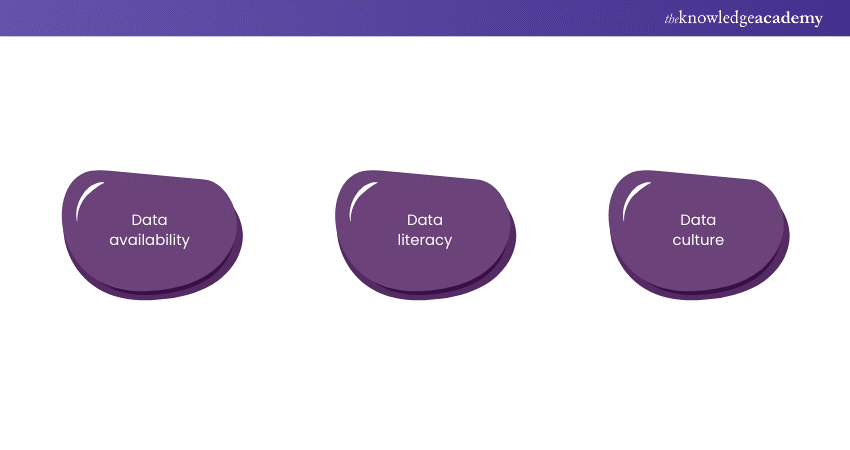We may not have the course you’re looking for. If you enquire or give us a call on +48 221041849 and speak to our training experts, we may still be able to help with your training requirements.
Training Outcomes Within Your Budget!
We ensure quality, budget-alignment, and timely delivery by our expert instructors.

Are you a fast and accurate typist with technical proficiency and an eye for detail? Then perhaps Data Entry is the domain for you. A Data Entry professional is responsible for transferring data from source documents to digital databases while maintaining accuracy and being thorough. According to Glassdoor, the average salary for a novice Data Entry Operator in the United Kingdom is £35,000 per year with excellent scope for growth and development.
However, the competition for these jobs is high and you need to stand out from the crowd to be picked. These Data Entry Interview Questions can help you do that. In this blog, we will delve into carefully curated Data Entry Interview Questions alongside sample answers and tips and tricks to help you get through the interview. Keep Reading to know more!
Table of Contents
1) Data Entry Interview Questions with sample answers
a) What does the term Data Entry entail?
b) How do you define accuracy, and how do you ensure it in your work?
c) Which data entry software or programs do you have experience with?
d) Define a Data Entry Operator and list some positions in data entry jobs.
e) What is the minimum qualification for becoming a Data Entry Operator?
f) What motivates your interest in starting a career in data entry?
g) How proficient and precise are you in keyboard typing?
h) Define WPM (Words Per Minute) in the context of data entry.
i) In your opinion, what skills are essential for a Data Entry Operator?
j) How would you assess your touch-typing ability?
k) Explain the significance of data to an organisation.
l) What is the primary focus of a Data Entry Operator?
m) Are filing and data entry synonymous?
n) Share information about some data validation tools.
o) How will you ensure consistent precision and accuracy in your data entry work?
p) What strengths do you possess relevant to this position?
q) What are the main obstacles a data-driven company must overcome?
r) Identify the most crucial components of a data entry job.
s) Have you previously held any roles involving data entry tasks?
2) Conclusion
Data Entry Interview Questions with sample answers
1) What does the term Data Entry entail?
Here’s how you can answer this question:
Data entry is entering, updating, verifying, and storing data in a computer system or database. Data entry can involve various types, such as text, numbers, images, audio, video, etc. Data entry can be done manually or automatically, depending on the source and format of the data.”
2) How do you define accuracy, and how do you ensure it in your work?
You can answer this question like this:

"Accuracy is the degree to which the data entered matches the source of the data. Accuracy is essential for ensuring the quality and reliability of the data and avoiding errors or inconsistencies. To ensure accuracy in my work, I follow these steps:
a) I check the source of the data carefully and ensure I understand the requirements and specifications of the data entry task.
b) I use the appropriate software or program for the data entry task and follow the instructions and guidelines provided.
c) I enter the data carefully and attentively, avoiding distractions and interruptions.
d) I review and proofread the data entered and compare it with the source data, correcting any mistakes or discrepancies.
e) I use the available tools or methods to validate and verify the data entered, such as spell-check, grammar-check, formulas, etc.
f) I seek feedback and suggestions from my supervisor or colleagues to improve my accuracy and performance."
Ready to crack your intrviews for a data entry role, refer to our blog on "Data Entry Job Description"
3) Which data entry software or programs do you have experience with?
Here’s how you can answer this question:
"I have experience with various data entry software or programs, such as:
a) Microsoft Excel: I use Excel to enter, manipulate, analyse, and present numerical and textual data in spreadsheets, tables, charts, etc. I am proficient in using Excel functions, formulas, macros, pivot tables, etc.
b) Microsoft Word: I use Word to enter, format, edit, and print textual data in documents, letters, reports, etc. I am familiar with Word features like styles, templates, mail merge, etc.
c) Google Forms: I use Google Forms to create, distribute, and collect online surveys, quizzes, feedback forms, etc. I can design and customise the forms, add different questions and responses, and analyse the data contained in Google Sheets.
d) Salesforce: I use Salesforce to enter, update, and manage customer data, such as contact information, preferences, interactions, etc. I can use Salesforce features like reports, dashboards, workflows, etc., to monitor and improve customer relationships and satisfaction."
4) Define a Data Entry Operator and list some positions in data entry jobs.
You can answer this question like this:

"A Data Entry Operator is a person who performs data entry tasks, such as entering, updating, verifying, and storing data in a computer system or database. A Data Entry Operator can work in various industries and sectors, such as healthcare, education, finance, retail, etc. Some positions in data entry jobs are:
a) Data Entry Clerk: A Data Entry Clerk is responsible for entering and processing data from various sources, such as forms, invoices, receipts, etc. A Data Entry Clerk may also perform other administrative tasks, such as filing, scanning, copying, etc.
b) Data Entry Specialist: A data entry specialist is responsible for entering and managing data in a specific domain or field, such as medical records, accounting records, inventory records, etc. A Data Entry Specialist may also perform data analysis, quality control, and reporting tasks.
c) Data Entry Analyst: A Data Entry Analyst is responsible for entering and analysing data to provide insights, recommendations, and solutions for business problems or opportunities. A Data Entry Analyst may also perform data visualisation, modelling, and presentation tasks."
5) What is the minimum qualification for becoming a Data Entry Operator?
Here’s how you can answer this question:
"The minimum qualification for becoming a Data Entry Operator may vary depending on the employer, industry, and position. However, some common qualifications are:
a) A high school diploma or equivalent
b) Basic computer skills and knowledge of data entry software or programs
c) Typing speed and accuracy
d) Attention to detail and accuracy
e) Communication and interpersonal skills
f) Ability to work independently and in a team
g) Ability to follow instructions and guidelines
h) Ability to meet deadlines and quality standards."
Take the first step towards career excellence with our Data Entry Masterclass – Sign up today!
6) What motivates your interest in starting a career in data entry?
You can answer this question like this:
“I am interested in starting a career in data entry because I enjoy working with data and finding patterns, trends, and insights from it. I also like the challenge of entering and managing large volumes of data accurately and efficiently. Data entry is a valuable skill that can open up many opportunities for me in different industries and sectors. I am eager to learn and improve my data entry skills and contribute to the organisation's success.”
7) How proficient and precise are you in keyboard typing?
Here’s how you can answer this question:
“I am proficient and precise in keyboard typing. I can type at a speed of 60 words per minute with an accuracy of 98%. I have taken online typing tests and courses to improve my typing skills and reduce errors. I also use keyboard shortcuts and commands to speed up my data entry tasks and avoid using the mouse unnecessarily. I always check and proofread my typing work to ensure accuracy and quality.”
8) Why are you interested in the role of a Data Entry Operator within our organisation?
You can answer this question like this:
“I am interested in the role of a Data Entry Operator within your organisation because I admire your mission and vision and the impact you make in your field. I have researched your organisation and learned about your values, culture, and goals. I am impressed by your achievements and innovations in data-driven solutions and services. I can add value to your organisation by applying my data entry skills and experience to support your data needs and objectives. I can also learn much from your organisation and grow professionally and personally.”
9) Define Words Per Minute in the context of data entry.
Here’s how you can answer this question:
“Words Per Minute (WPM) is a measure of typing speed and efficiency in data entry. It indicates how many words a Data Entry Operator can type in one minute. WPM is calculated by dividing the number of keystrokes by five, the average word length, and then multiplying by 60, the number of seconds in a minute. WPM is an important indicator of data entry performance and productivity, as it reflects how quickly and accurately a Data Entry Operator can enter data.”
10) In your opinion, what skills are essential for a Data Entry Operator?
You can answer this question like this:
"In my opinion, some of the essential skills for a Data Entry Operator are:
a) Typing skills: A Data Entry Operator should be able to type fast and accurately, using the keyboard and the mouse efficiently and effectively.
b) Data entry software skills: A Data Entry Operator should be familiar with the data entry software or programs used in the organisation, such as Excel, Word, Google Forms, Salesforce, etc., and be able to use their features and functions correctly.
c) Data analysis skills: A Data Entry Operator should be able to analyse the data entered and find patterns, trends, and insights using tools such as charts, graphs, tables, etc.
d) Data quality skills: A Data Entry Operator should be able to ensure the quality and reliability of the data entered by checking, proofreading, validating, and verifying the data and correcting any errors or inconsistencies.
e) Communication skills: A Data Entry Operator should be able to communicate clearly and professionally with the data sources, the data users, and the data team, and provide feedback and suggestions for improvement."
Transform your office expertise into a competitive advantage with our Office Skills Masterclass – Sign up now!
11) How would you assess your touch-typing ability?
Here’s how you can answer this question:
“I would assess my touch-typing ability by taking online typing tests and courses that measure my typing speed, accuracy, and efficiency. I would also compare my typing performance with the industry standards and benchmarks and identify my strengths and weaknesses. I would also seek feedback and guidance from my supervisor or colleagues on improving my touch-typing ability.”
12) Explain the importance of data to an organisation.
You can answer this question like this:
“Data is important to an organisation because it provides valuable information and insights that can help the organisation make better decisions, improve processes, enhance products and services, increase customer satisfaction, reduce costs, increase revenue, and achieve its goals and objectives. Data can also help the organisation monitor and evaluate its performance and progress, identify and solve problems, and discover and seize opportunities. Data can also help the organisation comply with the legal and ethical standards and regulations and maintain its reputation and credibility.”
13) What is the primary focus of a Data Entry Operator?
You can answer this question like this:
“The primary focus of a Data Entry Operator is to enter, update, verify, and store data in a computer system or database, accurately and efficiently, according to the requirements and specifications of the data entry task. A Data Entry Operator should also focus on maintaining the quality and reliability of the data and providing data analysis and reporting when needed.”
14) Are filing and data entry synonymous?
You can answer this question like this:
“No, filing and data entry are not synonymous. Filing is arranging and storing documents or records in a systematic and logical order, such as alphabetical, numerical, chronological, etc. Data entry is entering, updating, verifying, and storing data in a computer system or database. Filing and data entry are separate tasks and may require different skills and tools.”
15) Share information about some data validation tools.
You can answer this question like this:
"Some data validation tools are:
a) Excel Data Validation: This Data Validation in Excel feature allows you to set rules and criteria for the data entered in a cell or a range of cells, such as data type, data format, data range, data list, etc. You can also create custom error messages and input messages to guide the Data Entry Operator and prevent invalid data entry.
b) Google Forms Data Validation: This is a feature in Google Forms that allows you to set rules and criteria for the responses entered in a question, such as text, number, date, time, email, etc. You can also create custom error messages and hints to guide the respondents and prevent invalid responses.
c) Salesforce Data Validation: This is a feature in Salesforce that allows you to set rules and criteria for the data entered in a field or a record, such as data type, data format, data range, data list, etc. You can also create custom error messages and tips to guide the Data Entry Operator and prevent invalid data entry."
Discover your path to excellence with our PA and Secretarial Courses – Sign up now!
16) How will you ensure consistent precision and accuracy in your data entry work?
You can answer this question like this:
"I will ensure consistent precision and accuracy in my data entry work by following these steps:
a) I will plan and organise my data entry work, prioritising the most critical and urgent tasks and allocating enough time and resources for each assignment.
b) I will follow the instructions and guidelines provided by the data source, the data user, and the data team and clarify any doubts or queries before starting the data entry task.
c) I will use the appropriate data entry software or program for the data entry task to ensure it is updated and functioning correctly.
d) I will enter the data carefully and attentively, avoiding distractions and interruptions and using keyboard shortcuts and commands to speed up the data entry.
e) I will review and proofread the data entered and compare it with the source data, correcting any mistakes or discrepancies and using the available tools or methods to validate and verify the data entered, such as spell-check, grammar-check, formulas, etc.
f) I will seek feedback and suggestions from my supervisor or colleagues to improve my precision and accuracy and learn from my errors and experiences."
17) What strengths do you possess relevant to this position?
You can answer this question like this:
"Some of the strengths that I possess relevant to this position are:
a) Typing skills: I have excellent typing skills, with a speed of 60 words per minute and an accuracy of 98%. I can type fast and accurately, using the keyboard and the mouse efficiently and effectively.
b) Data entry software skills: I have extensive data entry software skills, with experience using various data entry software or programs, such as Excel, Word, Google Forms, Salesforce, etc. I can use their features and functions to enter and manage data properly and creatively.
c) Data analysis skills: I have strong data analysis skills, with the ability to analyse the data entered and find patterns, trends, and insights from it using tools such as charts, graphs, tables, etc. I can also provide data analysis and reporting when needed.
d) Data quality skills: I have exceptional data quality skills, with the ability to ensure the quality and reliability of the data entered by checking, proofreading, validating, verifying the data and correcting any errors or inconsistencies.
e) Communication skills: I have excellent communication skills, with the ability to communicate clearly and professionally with the data sources, the data users, and the data team, and provide feedback and suggestions for improvement."
18) What are the main obstacles a data-driven company must overcome?
You can answer this question like this:
"Some of the main obstacles a data-driven company must overcome are:

a) Data availability: A data-driven company must have access to sufficient and relevant data to support its decision-making and operations. However, privacy, security, ownership, quality, integration, and data availability may be limited.
b) Data literacy: A data-driven company must have the skills and knowledge to understand, interpret, and use data effectively and efficiently. However, data literacy may be lacking among the company's employees, managers, customers, or stakeholders, resulting in data misuse, misunderstanding, or mistrust.
c) Data culture: A data-driven company must have a culture that values and promotes data as a strategic asset and a competitive advantage. However, data culture may be hindered by factors such as data resistance, data silos, data bias, data ethics, etc."
19) Identify the most crucial components of a data entry job.
Here’s how you can answer this question:
“The most crucial components of a data entry job are accuracy, speed, and attention to detail. Accuracy means entering data without errors or mistakes, which can affect the quality and reliability of the data. Speed means entering data efficiently and within the given deadlines, which can improve the productivity and performance of the data entry process. Attention to detail means checking and verifying the data before and after entering it, which can prevent or correct any errors or inconsistencies.”
20) Have you previously held any roles involving data entry tasks?
You can answer this question like this:
“I have a strong background in data entry roles. As a Data Entry Clerk at [Company Name], I entered customer data, invoices, and orders into the database using the CRM system. In my other job as a Data Entry Operator at [Company Name], I entered survey, product, and inventory data into the spreadsheet using the Excel program. I always ensured the data I entered was accurate, fast, and detailed.”
Conclusion
Mastering these Data Entry Interview Questions is important for a successful job hunt. Demonstrating proficiency, accuracy, and a thorough understanding of the industry's nuances will undoubtedly set candidates apart. Preparing thoughtful responses to these questions ensures candidates navigate their interviews with confidence and leave a lasting impression.
Refine your office management prowess with our comprehensive Office Manager Masterclass today!
Frequently Asked Questions

Employers seek candidates with proficient typing and keyboard skills, attention to detail, and accuracy in data entry. Strong organisational abilities, familiarity with relevant software, and the capacity to handle repetitive tasks efficiently are also valued. Effective communication, adaptability, and a commitment to maintaining data integrity contribute to the comprehensive skill set employers look for in potential candidates during data entry interviews.

Candidates showcase accuracy and efficiency in data entry during interviews by emphasising their attention to detail, commitment to error-free work, and proficiency in relevant software. Providing examples of past experiences where they handled large volumes of data meticulously and met tight deadlines solidifies their credibility. Additionally, discussing strategies for double-checking entries and ensuring data integrity further underscores their dedication to delivering precise and efficient data entry.

Candidates facing a data entry job interview should prepare for questions on accuracy measures, familiarity with data entry software, and proficiency in keyboard typing. Additionally, expect inquiries about previous experience, understanding the importance of data to an organisation, and how to ensure consistent precision. Being ready to discuss strengths, data validation tools, and potential barriers in a data-driven environment will showcase comprehensive readiness for the role.

The Knowledge Academy takes global learning to new heights, offering over 30,000 online courses across 490+ locations in 220 countries. This expansive reach ensures accessibility and convenience for learners worldwide.
Alongside our diverse Online Course Catalogue, encompassing 17 major categories, we go the extra mile by providing a plethora of free educational Online Resources like News updates, Blogs, videos, webinars, and interview questions. Tailoring learning experiences further, professionals can maximise value with customisable Course Bundles of TKA.

The Knowledge Academy’s Knowledge Pass, a prepaid voucher, adds another layer of flexibility, allowing course bookings over a 12-month period. Join us on a journey where education knows no bounds.

The Knowledge Academy offers various PA and Secretarial Courses, including Data Entry Masterclass, Administrative Assistant, Secretarial Masterclass, and many more. These courses cater to different skill levels, providing comprehensive insights into Business Skills methodologies.
Our Business Skills blogs cover a range of topics related to Data Entry, offering valuable resources, best practices, and industry insights. Whether you are a beginner or looking to advance your Business Skills, The Knowledge Academy's diverse courses and informative blogs have you covered.
Upcoming Business Skills Resources Batches & Dates
Date
 Company Secretary Training Course
Company Secretary Training Course
Fri 14th Feb 2025
Fri 11th Apr 2025
Fri 13th Jun 2025
Fri 15th Aug 2025
Fri 10th Oct 2025
Fri 12th Dec 2025







 Top Rated Course
Top Rated Course



 If you wish to make any changes to your course, please
If you wish to make any changes to your course, please


